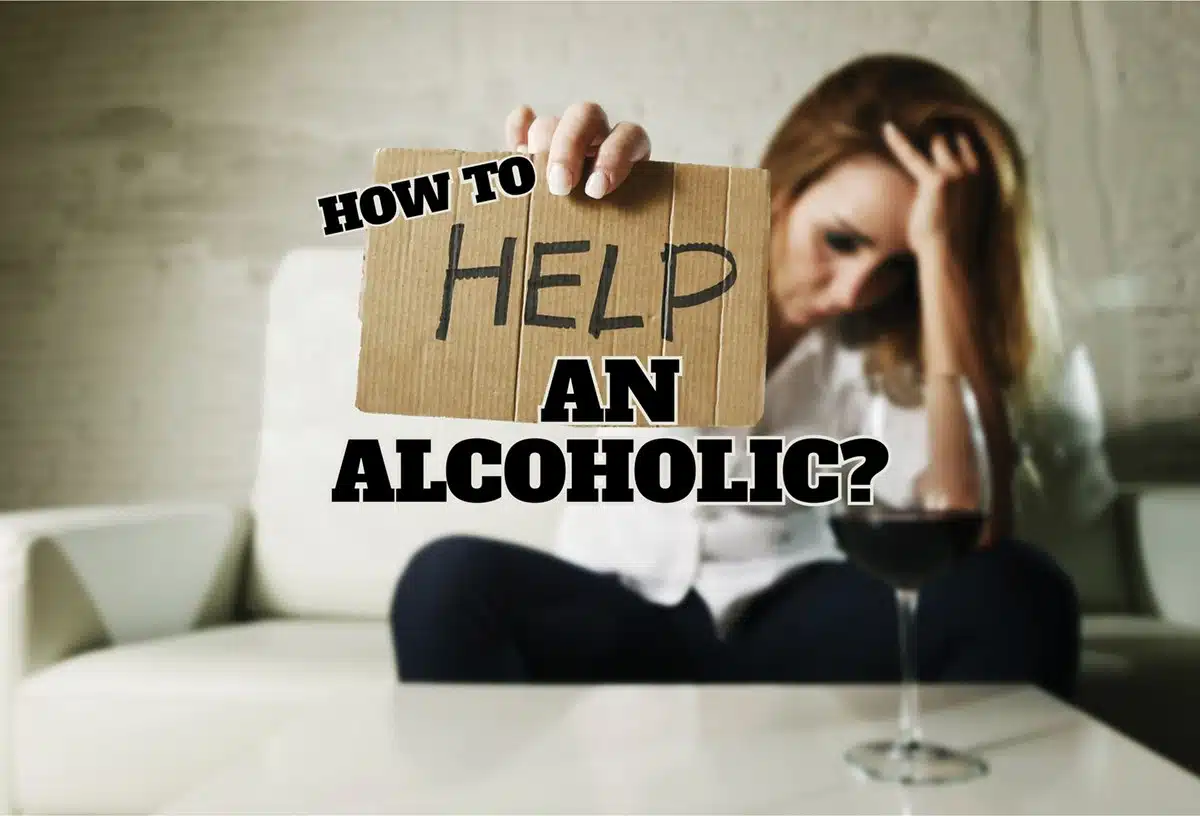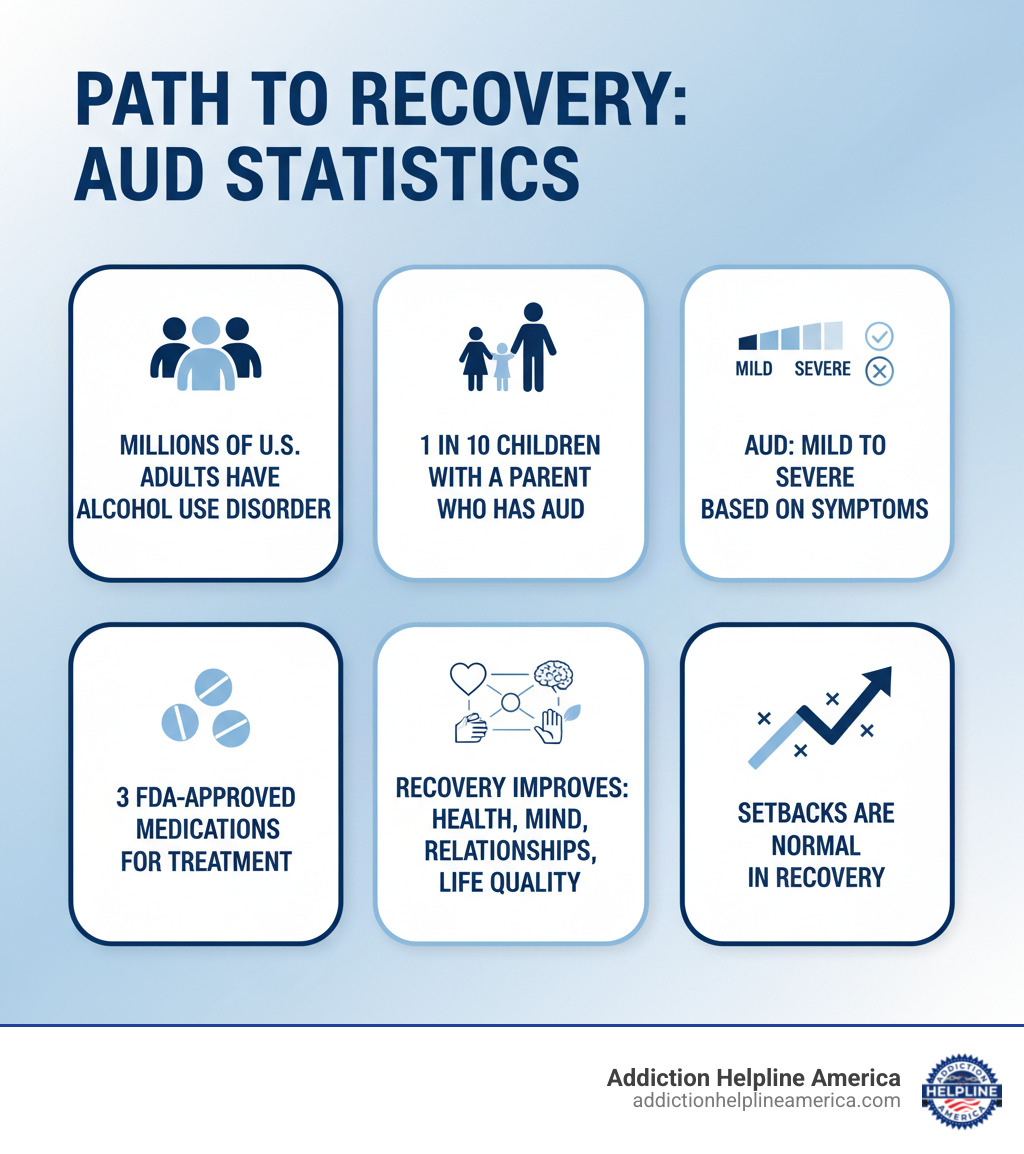
Understanding Your Options When You Need Help for Alcoholics
Help for alcoholics is available through many pathways, and recovery is possible no matter how severe the problem seems. If you or a loved one is struggling, here are the main types of support:
- Immediate Resources: For urgent crises, call the 988 Suicide & Crisis Lifeline or SAMHSA’s National Helpline at 1-800-662-4357. For medical emergencies like severe withdrawal, dial 9-1-1.
- Professional Treatment: Options include medical detox, inpatient/residential programs, flexible outpatient care, behavioral therapies (like CBT), and FDA-approved medications (Naltrexone, Acamprosate, Disulfiram).
- Support Systems: Peer groups like AA and SMART Recovery, family resources like Al-Anon, and guidance from your primary care provider are all vital parts of recovery.
Alcohol Use Disorder (AUD) is a medical condition characterized by an impaired ability to stop or control alcohol use despite negative consequences. The good news is that treatment works. Research shows that most people with AUD benefit from treatment and can achieve long-term recovery.
At Addiction Helpline America, we connect individuals and families with compassionate, confidential help for alcoholics. Our 24/7 helpline and referral services match you with the right resources for your unique situation.
Help for alcoholics terms to know:
Recognizing the Signs and When to Seek Help
The journey to recovery begins with recognizing that a change is needed. If you’re wondering if you or a loved one needs help for alcoholics, you’re taking a brave first step. AUD is a medical condition that affects the brain, not a matter of willpower.
According to the National Institute on Alcohol Abuse and Alcoholism, AUD is diagnosed when a person meets at least two specific criteria in a 12-month period. Key signs include:
- Increased Tolerance & Withdrawal: Needing more alcohol to get the same effect, or experiencing physical and emotional distress (shakiness, anxiety, nausea) when you try to stop. Severe withdrawal can cause seizures or delirium tremens (DTs) and requires immediate medical care.
- Loss of Control: Drinking more than you intended or being unable to cut back despite wanting to.
- Negative Consequences: Continuing to drink even when it causes problems with your health, job, or relationships.
- Life Disruption: Spending a lot of time drinking or recovering from it, neglecting responsibilities, and losing interest in other activities.
- Cravings: Experiencing strong, often overwhelming urges to drink.
If these signs are familiar, don’t wait to “hit rock bottom.” Seeking help for alcoholics at any stage can lead to better outcomes. For more guidance, visit our resource on how to quit drinking.
The Long-Term Effects of Untreated Alcoholism
Untreated alcohol addiction can damage nearly every part of the body and aspect of life. The consequences can be severe, but many are reversible with treatment.
- Physical Health: Chronic drinking can lead to fatal liver cirrhosis, digestive issues like pancreatitis, heart problems, a weakened immune system, and an increased risk for several types of cancer.
- Neurological Health: It can cause memory loss (blackouts), cognitive decline, nerve damage, and even dementia.
- Life Consequences: The financial and legal toll can include DUIs, job loss, and debt. Relationships with family and friends often break under the strain.
- Mental Health: Long-term alcohol use can worsen mental health conditions and dramatically increase the risk of suicidal thoughts and attempts.
These effects highlight why seeking help for alcoholics is so critical. To learn more about addiction, explore our guide on educating yourself about addiction.
Professional Treatment Pathways for Alcoholism
Finding professional help for alcoholics means accessing evidence-based care designed for lasting recovery. A thorough assessment will help create a personalized treatment plan, which may include medical detox, therapy, and medication.
For those with significant physical dependence, medical detox is a crucial first step. It provides safe, supervised management of withdrawal symptoms, preventing life-threatening complications. Choosing a licensed, accredited program that uses evidence-based practices is key to a successful outcome. We can connect you with reputable facilities nationwide. To learn more, visit our page on alcohol and drug rehab options.
Inpatient vs. Outpatient Programs
Choosing between inpatient and outpatient treatment is a key decision. The right choice depends on the severity of the AUD, your home environment, and other responsibilities.
Inpatient (residential) treatment offers 24/7 care in a structured, trigger-free environment. It’s ideal for those with severe AUD, a history of relapse, or co-occurring mental health disorders. For more details, see our page on residential treatment.
Outpatient treatment allows you to live at home while attending scheduled therapy. It’s a good fit for those with mild to moderate AUD and a stable, supportive home life.
| Feature | Inpatient (Residential) Treatment | Outpatient Treatment |
|---|---|---|
| Structure | 24/7 supervised care in a dedicated facility, highly structured daily schedule | Scheduled sessions (individual/group) while living at home, flexible schedule |
| Intensity | High intensity, immersive environment, removal from triggers | Variable intensity (standard outpatient, intensive outpatient, partial hospitalization) |
| Cost | Generally higher due to accommodation, meals, and round-the-clock care | Generally lower as it doesn’t include living expenses |
| Ideal Candidate | Severe AUD, unstable home environment, co-occurring disorders, history of relapse, need for medical detox | Mild to moderate AUD, stable home environment, strong support system, work/school commitments |
For those who need sustained support, long-term rehab can be beneficial.
Behavioral Therapies: A Cornerstone of Help for Alcoholics
Behavioral therapies are the foundation of effective help for alcoholics, teaching you to change problematic behaviors and develop coping skills.
- Cognitive-Behavioral Therapy (CBT) helps you identify and manage triggers that lead to drinking.
- Motivational Improvement Therapy (MET) builds your internal motivation to change.
- Contingency Management (CM) uses positive reinforcement to encourage abstinence.
- Family and couples therapy helps heal relationships and builds a supportive home environment.
All these therapies focus on identifying your personal triggers and developing skills to manage them without alcohol. Learn more about addiction triggers.
The Role of Medications in Recovery
Medications can be a powerful tool in providing help for alcoholics, especially when combined with therapy. The three FDA-approved medications for AUD are non-addictive and work by normalizing brain chemistry, reducing cravings, and helping you focus on recovery.
- Naltrexone reduces the pleasurable effects of alcohol and lessens cravings.
- Acamprosate helps reduce the emotional and physical distress of protracted abstinence.
- Disulfiram causes an unpleasant physical reaction if you drink alcohol, acting as a strong deterrent.
These medications are most effective as part of a comprehensive treatment plan. While they address alcohol dependence, other issues may require specialized care, such as rehab for prescription drug abuse.
The Power of Support Systems in Recovery
Recovery is rarely a solo journey. Building a strong support system is one of the most powerful forms of help for alcoholics, providing strength, accountability, and a sense of belonging.
Connecting with others who understand your struggle—counselors, supportive family, and especially peers in recovery—is transformative. This shared experience reduces the shame and isolation that fuel addiction. Knowing that others are rooting for you creates powerful motivation to stay committed. Research shows that social connection is a significant factor in successful recovery, promoting both healing and resilience.
Mutual-Support Groups
Mutual-support groups offer free, accessible peer support and have been a cornerstone of help for alcoholics for decades. Finding the right fit is key, as different groups resonate with different people.
- Alcoholics Anonymous (AA) is the most well-known group, using the Twelve Steps to guide members toward sobriety through peer support.
- SMART Recovery® uses science-based tools to focus on self-empowerment and practical coping skills.
- LifeRing Secular Recovery is a non-religious alternative that emphasizes personal responsibility.
- Women for Sobriety provides a supportive, women-only environment focused on self-esteem and positive thinking.
These groups provide a community where you can be honest without judgment. We can help you Find a support meeting near you to explore your options.
How Family and Friends Can Provide Help for Alcoholics
If you love someone with AUD, your support is crucial, but it must be balanced with self-care and healthy boundaries. Remember: you didn’t cause it, you can’t control it, and you can’t cure it.
- Get Support for Yourself: Groups like Al-Anon Family Groups and Alateen provide a safe space for families and friends to share their experiences and learn coping strategies.
- Set Healthy Boundaries: Avoid enabling behaviors—actions that shield your loved one from the consequences of their drinking. This isn’t about being cruel; it’s about allowing natural consequences to occur, which can motivate change.
- Offer Support, Not Control: Encourage professional help, listen without judgment, and express your concern. You can research treatment options or offer to drive them to an appointment.
- Consider Family Therapy: Counseling can help heal relationships, improve communication, and teach the entire family to function more healthily.
Supporting a loved one is a marathon. You need support, too. We offer resources for this role, including More info on getting treatment for a loved one and guidance on How to stage an intervention.
Navigating Your Recovery Journey
Recovery from alcohol addiction is an ongoing journey of growth, not a finish line. When we talk about effective help for alcoholics, we mean building a life that feels worth protecting. It’s about progress, not perfection.
Persistence is key. Some days will be easy, others will test you. The willingness to keep going despite struggles is what defines lasting recovery. Self-care—proper nutrition, exercise, sleep, and healthy stress management—is essential for building resilience. As you heal, you can find new meaning by reconnecting with passions, strengthening relationships, and building a life so fulfilling that alcohol no longer fits. For daily strategies, visit our page on staying sober.
Choosing the Right Program and Managing Co-Occurring Disorders
Finding the right help for alcoholics starts with choosing the right program. Look for facilities that are licensed and accredited, use evidence-based therapies, and create individualized treatment plans. A quality program will also have experienced staff, offer family involvement, and provide comprehensive aftercare planning.
Many people with AUD also face mental health challenges like depression, anxiety, or PTSD. This is called a co-occurring disorder or dual diagnosis. Treating only one condition while ignoring the other often leads to relapse. The most effective approach is integrated treatment, which addresses both the AUD and the mental health condition at the same time. If you’re facing this situation, specialized care is critical. Learn more about co-occurring disorders treatment.
Managing Setbacks and Preventing Relapse
A return to drinking after a period of sobriety is a setback, not a failure. The National Institute on Alcohol Abuse and Alcoholism notes that setbacks are a common part of the recovery process. Instead of viewing it with shame, see it as a learning opportunity to strengthen your recovery plan.
One useful technique is urge surfing, where you observe a craving without acting on it, recognizing that it’s a temporary wave that will pass. A proactive step is creating a written relapse prevention plan. This plan should identify your high-risk situations and list specific coping strategies and support contacts you can call on. Your support network is your lifeline when things get tough.
If you do slip, the most important step is to stop drinking immediately, reach out for help, and analyze what happened without judgment. For more detailed guidance, see our relapse prevention strategies.
Immediate and Specialized Help for Alcoholics
There are times when the need for help for alcoholics is urgent and waiting is not an option. In these critical moments, immediate intervention is necessary.
One of the most dangerous emergencies is alcohol withdrawal delirium, or delirium tremens (DTs). This can occur when a long-term heavy drinker suddenly stops and may involve confusion, hallucinations, seizures, and a racing heart. If you see these symptoms, call 9-1-1 immediately. This is a life-threatening condition that requires medical supervision.
Beyond acute crises, specialized help is available for complex situations, such as programs for co-occurring disorders, specific age groups, or those that honor unique cultural backgrounds. Knowing you have options is key. For urgent support, our guide on addiction and rehab hotlines provides critical information.
Accessing Crisis Support and Your Primary Care Provider
When a crisis hits, knowing where to turn can be life-saving. Keep these resources handy:
- 988 Suicide & Crisis Lifeline: Call or text 988 for 24/7 free, confidential support for emotional distress or suicidal crisis.
- SAMHSA National Helpline: Call 1-800-662-HELP (4357) for 24/7 referrals to local treatment and support groups.
- Addiction Helpline America: Our advisors are available 24/7 to provide free, confidential guidance and connect you to treatment centers.
- Al-Anon Family Groups: Call 1-888-425-2666 for support for family and friends.
Your primary care provider is also an excellent first point of contact. They can assess your drinking patterns, screen for AUD, and refer you to addiction specialists or treatment programs. Your doctor can be a trusted, non-judgmental ally in coordinating your care. For more information, visit our guide on substance abuse helplines.
Culturally-Sensitive Resources
Effective help for alcoholics must respect your culture, identity, and lived experiences. For many, especially those from marginalized communities, culturally-informed care is essential for healing.
For example, the Hope for Wellness Help Line (1-855-242-3310) offers culturally-sensitive crisis support for Indigenous peoples in the United States. The best programs integrate traditional healing practices or work with providers who understand the historical and socio-economic factors that contribute to addiction.
Whether you are part of a racial minority, the LGBTQ+ community, or another specific population, you deserve care that is inclusive and free from bias. This means finding a safe environment where providers understand your background and adapt treatment to be effective for you. We can help you Find culturally-sensitive help that honors your identity.
Frequently Asked Questions about Help for Alcoholics
Seeking help for alcoholics brings up many questions. Here are answers to some common concerns.
Is taking medication for AUD just trading one addiction for another?
No. The three FDA-approved medications for Alcohol Use Disorder (Naltrexone, Acamprosate, and Disulfiram) are non-addictive. They do not produce a “high” and are used to manage a chronic medical condition, much like insulin for diabetes. They work by normalizing brain chemistry and reducing cravings, which helps you focus on the behavioral work of recovery.
What is the difference between alcohol abuse and alcoholism?
Today, healthcare professionals use the term Alcohol Use Disorder (AUD), which is a clinical diagnosis that exists on a spectrum from mild to severe. This term replaced older, more stigmatizing labels like “alcoholism.” AUD is defined by a compulsive pattern of alcohol use despite negative consequences. The key is that it’s a treatable medical condition, and help for alcoholics is effective at any stage.
Can I recover without attending AA?
Yes, absolutely. While Alcoholics Anonymous (AA) has helped millions, it is not the only path to recovery. Many people find lasting success through other support groups like SMART Recovery, individual therapy (like CBT), medication, or a combination of approaches. The most effective recovery plan is the one that best suits your personal needs, beliefs, and circumstances. We can help you explore all options to find what’s right for you.
Your Path to Recovery Starts Today
Recognizing the need for help for alcoholics is a courageous first step. We want you to know that recovery is not only possible—it’s happening every day for people across the country.
You don’t have to walk this path alone. Effective help comes in many forms, from medical detox and behavioral therapy to medications and peer support groups. The key is finding the right combination for your unique situation.
Recovery is a process of persistence. There will be good days and hard days. What matters is that you keep showing up for yourself and celebrate every step forward. Every day of sobriety is a victory.
At Addiction Helpline America, our mission is to make that first step as simple as possible. Our team provides free, confidential guidance 24/7. We listen to your needs and connect you with fitting treatment programs from our nationwide network. Whether you need inpatient care, outpatient options, or specialized programs, we can help you find it.
Your healthier, alcohol-free life is waiting. You deserve healing and hope. Take the next step today by exploring your drug rehab options or reaching out to our compassionate advisors.
Our helpline is 100%
free & confidential
If you or someone you care about is struggling with drug or alcohol addiction, we can help you explore your recovery options. Don’t face this challenge alone—seek support from us.
Programs
Resources
Will my insurance
cover addiction
treatment?
We're ready to help
Find the best
drug or alcohol treatment
center
Are you or a loved one struggling with addiction? Call today to speak to a treatment expert.















